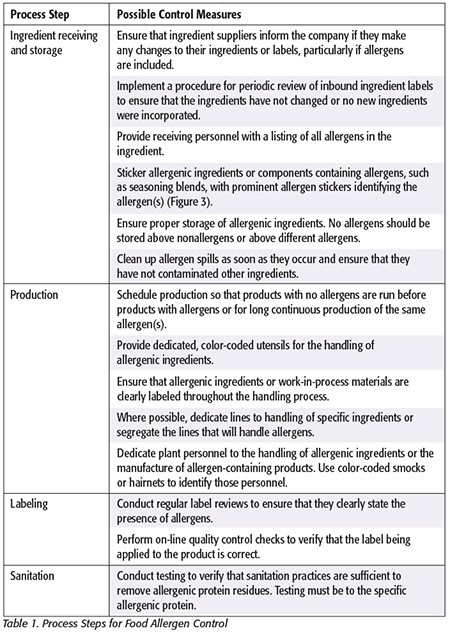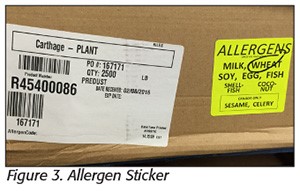When food safety issues impact on you personally, you tend to sit up and take note. Michael Cramer shares his experiences in this two part article used by permission from foodsafetymagazine.com
How Do We Prevent Allergen Contamination?
There are several means by which food manufacturers can prevent mislabeling or cross-contamination of their products. It is recommended that the facility map its process for handling allergens and determine points in the process where allergens can be controlled. An example of points in the process where controls may prevent allergen cross-contamination is provided in Table 1.

An example of a prominent allergen sticker identifying allergens in a case of food products is shown in Figure 3.

Training and Education
Even with the most thorough and well-designed process mapping to prevent allergen cross-contamination, the possibility remains that personnel will make mistakes, especially if they have not been trained or educated in food allergen management strategies. It is extremely important that all plant personnel receive specific and documented training regarding food allergen handling, particularly if this is or may be part of their assigned duties. New Food Safety Modernization Act (FSMA) regulations now require that allergen cross-contamination be included in company Good Manufacturing Practices. FSMA also requires that plant management ensures that all employees, including temporary employees, have received documented food safety training, including allergen training. An effective allergen management training and education program will be necessary to ensure that employees who receive and store allergenic ingredients, who handle allergenic ingredients in the manufacturing process, who label finished goods and who clean the plant can help prevent the cross-contamination and mislabeling of food products.
It is my hope that no one reading this article will ever have to go through an allergic experience the way I did. But I also hope that you and your food plant teams will become zealots for the prevention of allergen cross-contamination and mislabeling to protect consumers, prevent serious allergen-related hospitalizations and reduce the number of allergen-related recalls.
Article reproduced with permission from Food Safety Magazine
http://www.foodsafetymagazine.com/magazine-archive1/augustseptember-2016/allergen-management-a-personal-and-professional-perspective/
Editor's Note
The Department of Health also issued guidelines for dealing with allergens. These guidelines deal with the following:
Allergen control and pre-requisite programs (PRPs)
Allergen control starts with receiving of ingredients all the way through to despatch of products. The following should incorporate allergen control measures:
- Premises and equipment design for easy cleanup
- Sanitation in standard operating procedures
- Sanitation and control during receiving and storage
- Sanitation and control of distribution points
- Separate preparation areas
- Education/staff training
- Traceability protocols
Processing procedures
The company should ensure that the correct processing methods/procedures are followed and should not allow allergen cross-contamination.
Supplier control
Ingredient or additive Specifications should address allergens
Supplier information questionnaires
These help to identify how the supplier manages their allergens and whether their problem can become your problem.
Allergen audit
An Allergen audit, possible done as part of the HACCP study, can identify possible problem areas and their potential severity.
Allergen risk communication
If a risk of allergen contamination is identified in a food manufacturing facility, this risk needs to be communicated. This communication needs to be directed towards employees (in order to reduce the risk),and to consumers (in order to afford protection from a potential allergic reaction).
Source: Food Safety Magazine





